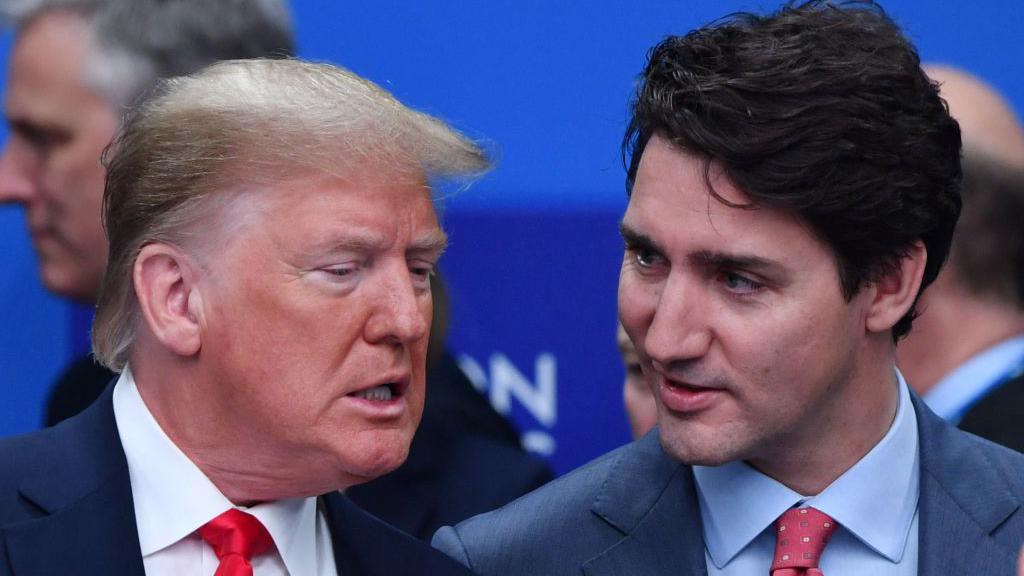'No-one will win' - Canada, Mexico and China respond to Trump tariff threats

- Published
Officials from Canada, Mexico and China have warned US President-elect Donald Trump's pledge to impose sweeping tariffs on America's three largest trading partners could upend the economies of all four countries.
"To one tariff will follow another in response and so on, until we put our common businesses at risk," Mexico's President Claudia Sheinbaum said.
Trump vowed on Monday night to introduce 25% tariffs on goods coming from Mexico and Canada and an additional 10% on goods coming from China. He said the duties were a bid to clamp down on drugs and illegal immigration.
Canada's Prime Minister Justin Trudeau said he spoke to Trump in the hours after the announcement and planned to hold a meeting with Canada's provincial leaders on Wednesday to discuss a response.
A spokesman for China's embassy in Washington DC told the BBC: "No-one will win a trade war or a tariff war.”
The international pushback came a day after Trump announced his plans for his first day in office, on 20 January, in a post on his social media website, Truth Social.
Trudeau said his country was prepared to work with the US in "constructive ways".
"This is a relationship that we know takes a certain amount of working on, and that's what we'll do," Trudeau told reporters.
In a phone call with Trump, Trudeau said the pair discussed trade and border security, with the prime minister pointing out that the number of migrants crossing the Canadian border was much smaller compared with the US-Mexico border.
Trump's team declined to confirm the phone call.
But Trump spokesman Steven Cheung added that world leaders had sought to "develop stronger relationships" with Trump "because he represents global peace and stability".
Mexico's President Sheinbaum told reporters on Tuesday that neither threats nor tariffs would solve the "migration phenomenon" or drug consumption in the US.
Reading from a letter that she said she would send to Trump, Sheinbaum also warned that Mexico would retaliate by imposing its own taxes on US imports, which would "put common enterprises at risk".
She said Mexico had taken steps to tackle illegal migration into the US and that “caravans of migrants no longer reach the border”.
The issue of drugs, she added, “is a problem of public health and consumption in your country’s society”.
Sheinbaum, who took office last month, noted that US car manufacturers produce some of their parts in Mexico and Canada.
"If tariffs go up, who will it hurt? General Motors,” she said.
Meanwhile, a spokesman for China's embassy in Washington, Liu Pengyu, told the BBC that "China-US economic and trade co-operation is mutually beneficial in nature".
He denied that China allows chemicals used in the manufacture of illegal drugs - including fentanyl - to be smuggled to the US.
"China has responded to US request for verifying clues on certain cases and taken action," Liu said.
"All these prove that the idea of China knowingly allowing fentanyl precursors to flow into the United States runs completely counter to facts and reality."
President Joe Biden has left in place the tariffs on China that Trump introduced in his first term, and added a few more of his own.
Currently, a majority of what the two countries sell to each other is subject to tariffs - 66.4% of US imports from China and 58.3% of Chinese imports from the US.
Speaking in the House of Commons in Ottawa, Trudeau told lawmakers that "the idea of going to war with the United States isn’t what anyone wants".
He called on them to not "panic", and to work together.
"That is the work we will do seriously, methodically. But without freaking out,” he said.
The leaders of Canadian provinces suggested that they would impose their own tariffs on the US.
"The things we sell to the United States are the things they really need," Deputy Prime Minister Chrystia Freeland said on Tuesday. "We sell them oil, we sell them electricity, we sell them critical minerals and metals."
America's northern neighbour accounted for some $437bn (£347bn) of US imports in 2022, and was the largest market for US exports in the same year, according to US data.
Canada sends about 75% of its total exports to the US.
Doug Ford, the premier of Ontario, Canada's most populous province, said on Monday the proposed tariff would be "devastating to workers and jobs in both Canada and the US".
“To compare us to Mexico is the most insulting thing I’ve ever heard,” said Ford.
Ford was echoed by the premiers of Quebec, Saskatchewan and British Columbia, while a post on the X account of Alberta Premier Danielle Smith acknowledged that Trump had "valid concerns related to illegal activities at our shared border".
The Canadian dollar, the Loonie, has plunged in value since Trump vowed to impose tariffs on Canadian imports come January.
The Canadian dollar dipped below 71 US cents, the lowest level the Loonie has fallen to since May 2020, when Trump threatened to impose tariffs on Canadian goods during his first stint as US president. The Mexican peso fell to its lowest value this year, around 4.8 cents.


North America correspondent Anthony Zurcher makes sense of the presidential election in his twice weekly US Election Unspun newsletter. Readers in the UK can sign up here. Those outside the UK can sign up here.